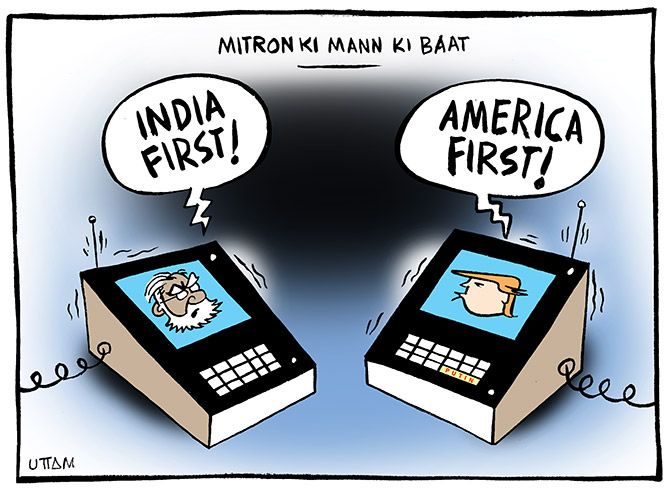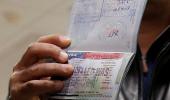'There will be some issues of contention, especially on H1B visa and on trade policy.'
Illustration: Uttam Ghosh/Rediff.com

Dr Vijay Chauthaiwale, chief of the Overseas Friends of Bharatiya Janata Party, tells Archis Mohan there might be hiccups in India-US relations during the Donald Trump administration, but by and large ties would be positive.
The recent electoral victories have made Prime Minister Narendra Modi's position in domestic politics so much more unassailable. How could this impact his foreign policy?
Modi has already put a significant stamp on his foreign policy agenda in the first half of his tenure, and now with these results it will definitely have a positive impact.
Already, the international press, and also rating agencies like Moody's, have reacted positively.
In the context of several changes in the global scenario and upcoming uncertainties in Europe, I think this domestic popular support for the PM will help us go from strength to strength.
Few leaders after Indira Gandhi have enjoyed such domestic popularity. Could this help the PM lead India to solve some of its more intractable problems with its neighbours, like the border dispute with China or relations with Pakistan?
I don't think we should club these issues together. With China, even though we have several differences, we are still talking a lot.
For example, Foreign Secretary S Jaishankar last month visited China. India-China border talks are an ongoing process and remain uninterrupted despite changes in the regime in India.
So, we are hopeful that relations will be better despite some differences, for example on India's membership to the Nuclear Suppliers Group or the China Pakistan Economic Corridor.
As far as Pakistan is concerned, the ball is in Islamabad's court. It depends on how sincere they are in their anti-terrorist measures.
So, I guess these two, we need to delink.
How do you see India-US relations, particularly since you have been one of the key players in New Delhi's outreach to the Trump administration?
As our senior leader (BJP General Secretary) Ram Madhav recently wrote, India-US relations will be more transactional (under the current regime) than what these were during the previous regime (the Barack Obama administration), and we need to accept that change.
There will be some issues of contention, especially on H1B visa and on trade policy.
At the same time, there are new opportunities, for example, the US exiting the Trans-Pacific Partnership agreement, which gives us more leeway to have bilateral negotiations with several countries, including the US.
Our defence cooperation is strong and that will continue with the Trump administration also.
There is bipartisan support in the US Congress on strong India-US relations. There might be some hiccups, but by and large things will move in a positive direction.
There is speculation that Shalabh Kumar or Ashley Tellis could be the next envoy to India of the US?
It is the prerogative of the US administration whom to appoint. I think both Kumar and Tellis understand India well.
We will welcome anyone who has a good understanding of the depth and breadth of India-US relations, irrespective of whether he is of Indian origin or not.
We have had US envoys of Indian origin, who were very successful, as also people who were not of Indian origin, like Robert D Blackwill and Senator (Daniel Patrick) Moynihan, who were extremely successful in building India-US relations.
The PM's Israel visit is much anticipated. You were recently in Israel. What are the expectations?
I have just been to Israel to attend one conference on the Diaspora, which was organised by the Israeli foreign office.
I also met policymakers in Israel and a large section of the India-Jewish Diaspora -- they are enthusiastic about the PM's visit.
It is a well-known fact that Benjamin Netanyahu, the PM of Israel, and Modiji have a good personal equation.
The Jewish community in general is positive towards Modiji and India. I think it will be a historic visit.
Will there be criticism of and a fallout on India-West Asia relations if the PM were not to visit Palestine?
It is not for me to say whether he will visit Palestine or not. It will be his considered decision.
But I think we have now built strong relations with all the major countries in West Asia, whether Saudi Arabia, the United Arab Emirates or Iran.
Even though these countries have conflicting interests within themselves, India has been deftly able to manage these equations and look out for furthering India's interests.
Whether the PM goes there or not, India-Palestine relations will remain strong.
Neighbourhood first was the narrative of the PM's first year of foreign policy. The focus in the second year was on the extended neighbourhood, in West Asia and South-east Asia. What will be the narrative next year?
I think the role of some of the multilateral bodies needs a relook.
There is the Non Aligned Movement, and there is uncertainty about its purpose.
There is also the Commonwealth, which needs to redefine its objectives in the post-Brexit era.
BRICS is also at a similar stage.
More nationalist and conservative leadership is emerging throughout the world.
The UK is going through a process of assessing its relations with the rest of Europe.
These are the issues we should focus upon.
Do you think the BJP, with its nationalist ideological base, might find any commonality with the nationalist leaderships emerging in the rest of the world?
Our nationalism is not exclusive.
In some cases in the rest of the world, it might be exclusive and therefore have some repercussions.
It is an evolving situation. But I don't see any commonality.
How is India preparing for a post-Brexit world?
The UK, at least in the next couple of years, would be too involved in conducting negotiations with the rest of Europe. We need to wait and watch the situation.
There are lots of people in Britain who say the situation would lead to increased interaction between the UK and India and open up newer avenues.
But the anti-immigration trend is not conducive to students going from India. Newer issues could emerge.
You have been at the helm of the OFBJP for nearly three years now. What have been the changes?
A major change was that in countries where the Indian Diaspora is present we started working on advocacy-related issues rather than simply managing events. That has been a major shift.
For example, just last fortnight the OFBJP and other community organisations demonstrated in front of the CNN Centre (CNN's headquarters) against their controversial and deplorable documentary film, Believer, which shows Hindu dharma in poor light.
We are doing such advocacy on other issues as well. After the Kansas attack on Indians, the OFBJP wrote to Senators and Congressmen.
We are doing such advocacy, which we weren't doing in the past, with more vigour, not just in the US, but also in Australia and other countries.
We are also encouraging -- and we plan to pursue this more aggressively in the months to come -- the Indian Diaspora to become part of Modiji's social programmes.
There is now a platform by the ministry of external affairs, the India Development Foundation through which the Diaspora can contribute financially to programmes like Swachh Bharat.
The good part is the IDF doesn't have any overheads, so 100 per cent of the money is allocated to the project and a completion certificate is sent to the donor.
DON'T MISS the features in the RELATED LINKS below...












 © 2025
© 2025